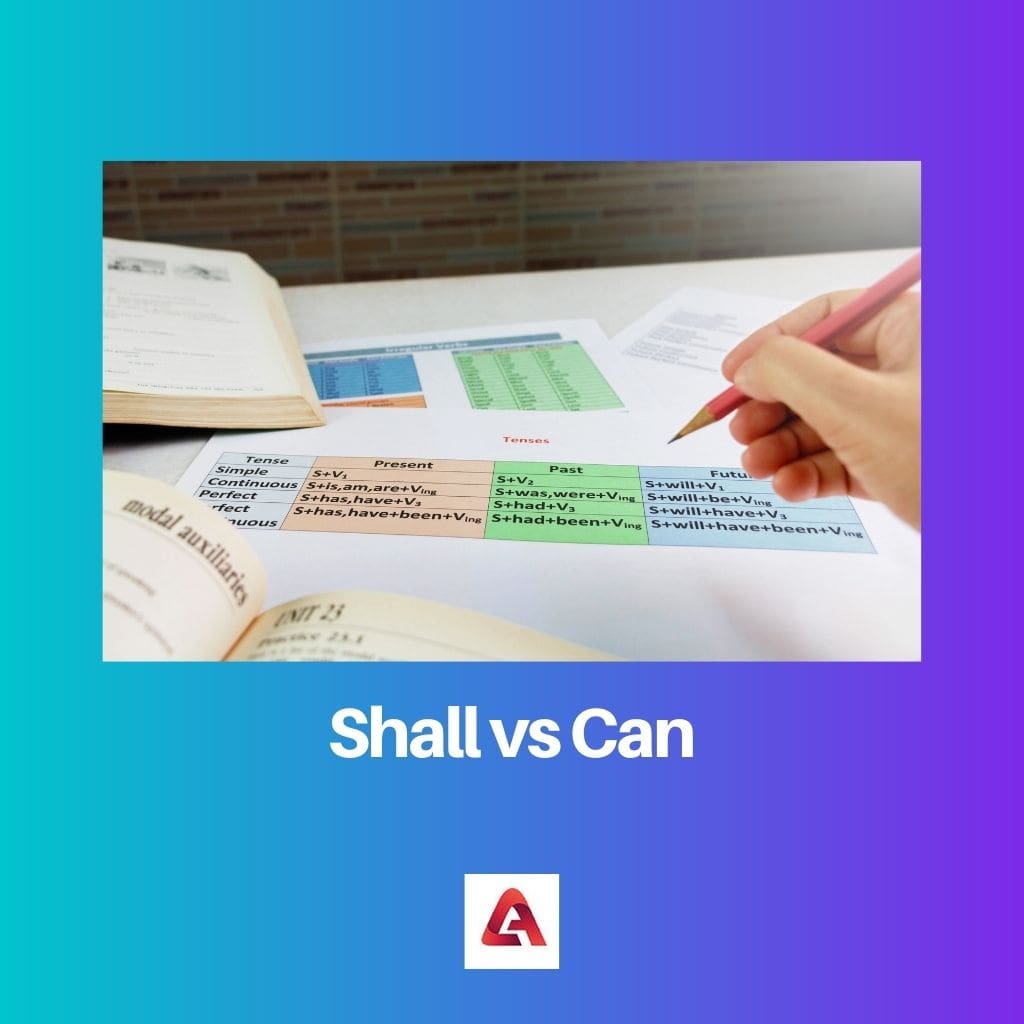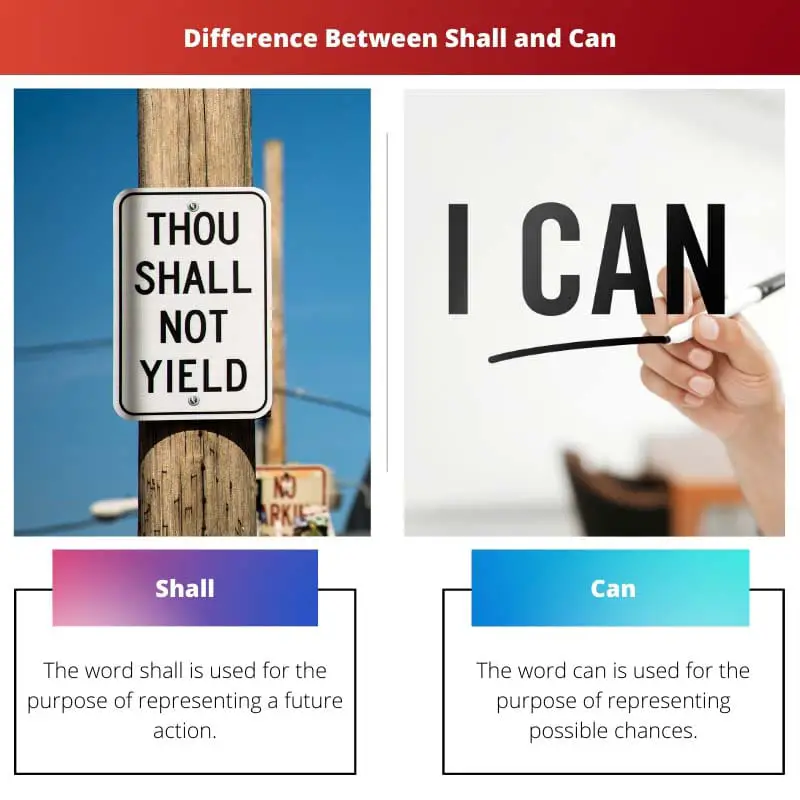In English grammar, we have particular words (modal verbs) that simplify more significant action sentences into simple terms that denote future actions or events in the lineup.
In modern English, ‘shall’ has become uncommon. That means most people don’t use this word. In American English, ‘shall’ is rarely used – it’s mainly found in some questions.
Some words like ‘can’ are used to show ability, possibilities, and polite expressions.
There are some words like ‘shall’ used to represent everyday future events and future solid events.
Key Takeaways
- “Shall” is a modal auxiliary verb used primarily to indicate future actions or intentions, especially in formal or legal contexts. At the same time, “can” is a modal auxiliary verb used to express ability or possibility.
- “Shall” describes actions that are planned or certain to happen, while “can” denotes actions that are possible or within someone’s capacity to perform.
- Both “shall” and “can” are important for conveying different aspects of actions or events, but their meanings and applications are distinct.
Shall vs. Can
The difference between Shall and Can is that Shall is utilized as the future tense while making an offer or giving suggestions. Can is used as the present tense to express opportunities or alternatives, to promise, or for volunteering.

Comparison Table
| Parameter of Comparison | Shall | Can |
|---|---|---|
| Purpose | The word shall is used to represent a future action | The term can is used to represent possible chances |
| Mood | Creates a probable positive sentence | Completes a definite positive sentence |
| Usage | Formal statements to describe obligations | Traditional ideas for asking for permissions |
| Situation | We use shall when we need to make an offer or suggestion | We use can when we need to proclaim the output that is a result of finishing a task |
| First-person pronoun usage allowed | Shall is allowed without any constraints | Can is permitted under certain constraints |
When to Use Shall?
Shall belong to the modal verb category used to indicate future action. It is most commonly used with the first-person pronouns I and We to express a future move.
In formal English, Shall will be used to explain and describe the events that will happen in the future and always gives room for expressing the happenings as predicted.
Shall is more used and heard in British English when compared to American. The usage is also seen most in the formalized format of the language.
Shall is used to express determination in a context (formal context).
Example 1: “All visitors shall observe our regulations”
The following usage of the word shall is for suggestions like an introductory example.
Example 2: “Shall we start our lessons? “.
In British English, shall is used for an intonation more promising or volunteering for something.
We use a subject with shall, a verb, and an object for positive sentences. We use a topic with shall and not, a verb, and a thing for negative sentences. We use WH with shall, subject, and verb with an object for interrogative sentences.
Uses of shall in a nutshell:
We use shall for determination, suggestions, promise,s and volunteering, future events that indicate inevitably. Below mentioned are some examples:
- Shall I get some coffee?
- That luggage looks heavy. Shall I carry it?
- What Shall I do with your instructions?

When to Use Can?
It is one of the most commonly used modal verbs in English Grammar. We use the word can to express an opportunity or ability, permissions, and to discover/project the possibilities.
Example 1:
The speaker says: I can leave my car in that parking space.
Here the example expresses that the speaker will possibly leave the vehicle.
Example 2:
The speaker asks: Can you help me with my work?
Here the example focuses on the informal request.
Can is used in a sentence in both positive and negative forms based on the context of general ability, ability during a specific event and in an opportunity also, and they can also be categorized for all three forms i.e.
The three major applications of can in sentences are:
- Expressing ability: Physically able to perform the task or complete the task
- Example 1: I can cook well.
- Example 2: Birds can fly.
- Finding out the possibility: It is about predicting the possible outcome.
- Example 1: I know you can get good results.
- Example 2: I can complete this task for you in a day.
- Offering concept: Offering help to someone in need.
- Example 1: Can I carry a bottle of water for you?
- Example 2: Can I get back to you in some time?
- Request something: To ask for permission.
- Example 1: Can I sit in that chair allotted to me, please?
- Example 2: Can I go ahead with your confirmation?

Main Differences Between Shall and Can
- The main difference between shall and can is the tense that is associated with it. Shall is always in the future tense and can always is in the present tense.
- Shall focus on making an offer or suggestions but can focus on expressing opportunities, promising, and volunteering.


A very informative article, thank you for taking the time to clarify the differences between ‘shall’ and ‘can’
I agree, this article is very helpful in understanding the subtle nuances of these modal verbs.
I found this article to be very insightful and detailed. It effectively highlights the distinctions between ‘shall’ and ‘can’.
The examples used are articulate and enhance the clarity of the text.
The explanations provided in this article are concise and informative.
The content is well-structured and provides a comprehensive understanding of the distinctions between ‘shall’ and ‘can’.
Absolutely, the article serves as a valuable guide in navigating the usage of these modal verbs.
This article cleared up my confusion regarding the proper usage of ‘shall’ and ‘can’.
The engaging nature of the article makes it a compelling read on the topic of ‘shall’ and ‘can’.
I found the discussion on ‘shall’ and ‘can’ to be both stimulating and educational.
I’m glad I came across this article. It’s an excellent resource for understanding the intricacies of these modal verbs.
Indeed, it offers a comprehensive analysis of ‘shall’ and ‘can’.
The well-organized structure of this article makes it easy to comprehend the intricacies of these modal verbs.
I couldn’t agree more. The comparisons drawn in the text are extremely helpful.
Great details, this was an enlightening read.
The article effectively outlines the key differences between ‘shall’ and ‘can’, providing valuable insights into their usage.
I appreciate the depth of understanding this article imparts on the subject matter.
A well-researched and enlightening piece. The examples offer great clarity.
The content is well-written and easy to understand. It provides a clear explanation.